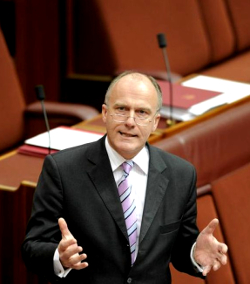Opponents take up pens in public wage fight
 Public Service Minister Eric Abetz has written a letter to the media in response to claims that public servants are being ripped-off in recent pay negotiations.
Public Service Minister Eric Abetz has written a letter to the media in response to claims that public servants are being ripped-off in recent pay negotiations.
The Canberra Times ran a story saying public servants have not had a pay rise in 18 months and predicted they will not get one in the next two years.
“The government's ‘APS bargaining framework’ rules out absolutely any wage increases that are not paid for with cuts to conditions and entitlements,” the original piece stated.
“The official euphemism ‘productivity offsets’ is a fiction. They are cuts.”
The claims clearly rubbed Mr Abetz the wrong way, as evidenced in a letter published a few days later.
The minister said public servants have in fact scored wage increases much greater than those paid to private sector workers in the past 10 years.
Mr Abetz said that it was "a fact that APS median wage rises have totalled 42 per cent over the last decade, compared to CPI increases of 28 per cent".
“Most private sector employees could only dream of such largesse at the present time,” he said.
Abetz has since continued his push for low or no wage increases this year for Commonwealth bureaucrats.
But the sitauaiton may not be as clear-cut as either side suggests.
Current Australian Bureau of Statistics figures shows that from June 2004 to June 2014, total pay in the private sector rose by 42.4 per cent and 45.9 per cent in the broader public sector – meaning there is a narrower gap than Mr Abetz said between pay rises for workers in the private and public sectors over the past decade.
In fact, research by the Parliamentary Library puts Senator Abetz and his federal parliamentary colleagues on top of the pile, having scored increases to their base salaries of more than 68 per cent between 2003 and 2013.
Abetz also claimed it was “simply wrong” to describe the “productivity offsets” as cuts to conditions and entitlements.
“Rather, genuine productivity gains are demonstrable, permanent improvements in the efficiency, effectiveness and/or output of employees, based on improvements of work practices or conditions,” he wrote.
“This year will be a better year for public servants if the CPSU accepts it has had a good run and that it is now time to consider the long-term interest of public servants, as well as community expectations.
“Public servants need to understand that the CPSU's wage claim simply cannot be paid for by the government borrowing even more money.
“It could only be paid for through more job losses. If paid in full, the CPSU's claim would cost at least 10,000 public service jobs,” the Minister wrote.
CPSU acting national secretary Michael Tull has responded to the response, saying the government's “hard-line” public service industrial policies were behind the delays in signing agreements.
“Because of the Senator's unworkable hard-line bargaining policy not one agreement has been made in the public sector,” Mr Tull said.
“Just before Christmas 95 per cent of staff in the Senator's own [Employment] department emphatically rejected a deal that would have cut their wages, conditions and jobs.
“Instead of writing letters to the editor, perhaps the Minister should now accept the CPSU's outstanding invitation to sit down and negotiate a sensible path to settlement.”







 Print
Print